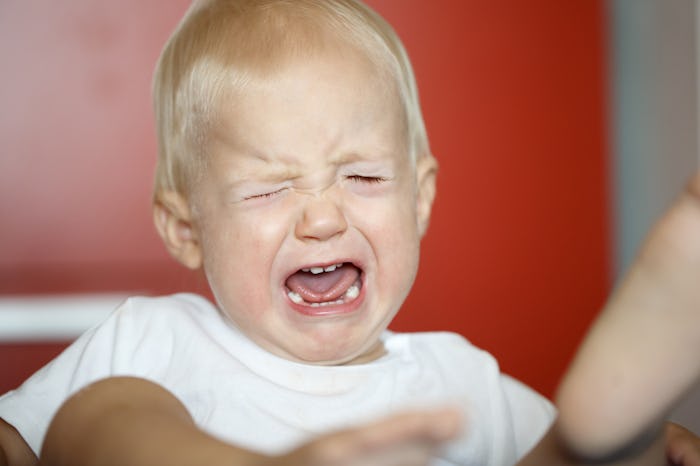Life

7 Things Your Toddler Is Trying To Say When They're Having A Complete Meltdown
I'd just picked my daughter up from preschool when my she started to wail from the back seat. She wanted her teacher, a snack, and to wear her winter hat in 80 degree weather. I pulled over when she said she had to pee, but she didn't and was indignant that I wouldn't take her into the real estate office (no, they don't sell milkshakes). What was going on? I know I'm not the only parent who needs a translator for their kid, so I looked into what a toddler is trying to say when they have a meltdown.
Throwing a bonafide fit is a normal part of life with a toddler. According to What to Expect, tantrums are most common between ages 2 and 3, although they can certainly start earlier and continue into early childhood. Still, it can be hard not to feel personally victimized when your child is having a fit, particularly if it's in public. Understanding why little ones have meltdowns is the first step toward effectively managing and eventually preventing them from occurring (or at least reducing their frequency). That starts with knowing the triggers, and trust me when I say that, unfortunately, there are a lot of them.
Before you assume that your kiddo is completely off their rocker (and believe me, I've been there), consider their still-developing brains. Their emotional outburst may be their only way of communicating the following:
"I'm Tired And/Or Hungry"
Pure exhaustion or a case of the hangries might not be enough to cause a tantrum by themselves, but they certainly make it more difficult for a child to endure disappointment of any kind. This one's on us as parents. If we let our kids go too long without some nourishment, or let our Target trip run into naptime, we're asking for it.
"I'm Frustrated"
Toddler frustration stems from a variety of sources. Perhaps most significant is their lack of language skills. They can't label the feelings they're experiencing, nor can they verbally navigate a solution to the problem that's causing them so much distress.
Another source of irritation is toddlers' inability to distinguish between a want and a need. Combine that with non-existent patience and complete lack of understanding of time, and you have a recipe for a full on freak-out.
"I'm Overwhelmed"
According to Supernanny, it's easy for a child to become emotionally overloaded. It makes sense when you think about how many new experiences they have to maneuver on a daily basis. We, as parents, need to manage the situations we put little kids in.
My daughter was a nightmare on our Europe trip, but I'm the one who put her on a plane for 12 hours and then ran her around seeing the sights, while adding her deployed dad (who she hadn't seen in nine months) to the mix. That's a lot for an adult, much less a 23-month-old child.
"I Have Big Feelings"
According to Parenting, the prefrontal cortex, which controls emotion and social behavior, is the final area of the brain to develop. That means your toddler is dealing with emotions like anger, fear, and frustration without the means to cope with them. Big feelings in a little person call for empathy, not discipline.
"I'm Anxious"
Irrational fears are common in young ones, because they don't have a fully developed sense of cause and effect. Some kids are afraid of the bathtub, for example, because they don't have a reasonable expectation that they won't go down the drain, too. They also haven't yet internalized the fact that, as Daniel Tiger puts it, adults go away but they come back.
Toddlers aren't logical beings, so "normal" occurrences may alarm or confuse them. Their little bodies respond by releasing cortisol, the "fight or flight" hormone. Frequent outbursts are a sign that your child is under chronic stress and needs to be assessed by a professional.
"I've Hit My Limit"
Overstimulation is another major cause of tantrums. You've probably noticed that your child is more susceptible to fits during parties or holidays (mine also has more toileting accidents). Stay tuned-in to your child so you'll know when they need a day at home, or just a second alone and away from the party before the piñata.
When my sister came to visit, we ran my daughter all over town and she was not having it. We'd pushed her too hard and surprise, surprise, she was much better behaved when we spent a day playing in the backyard.
"I'm My Own Person"
A toddler's burgeoning sense of independence, although a good thing in the long run, often tells them that they're more capable than they really are. So you may be dealing with frustration that they've bitten off more than they can chew, pushback against too many limits imposed by you, or a combination of both.
If the frustration is based on physical limitations, they may need some gentle guidance or more opportunities to be successful (think play gym). If your child is telling you they want more control, it could be time to offer more choices. In both cases, your kid needs you to respect the person they are and who they are becoming.
Check out Romper's new video series, Bearing The Motherload, where disagreeing parents from different sides of an issue sit down with a mediator and talk about how to support (and not judge) each other’s parenting perspectives. New episodes air Mondays on Facebook.